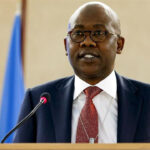
Any keen observer of the Nigerian tertiary sector in the last two years would have noticed a substantial form of stability that is set to herald a new beginning and mark a decisive departure from the era of incessant industrial actions with resultant disruption of academic calendar and poor output performance, all owing to the scourge of corruption, impunity and irresponsible leadership.
We recall that a major part of the grievances that drive incessant strike actions by practitioners in the sector had to do with poor funding of the institutions blamed for the inability of the sector’s players to compete effectively with their counterparts in different parts of the world. The other ones are poor remuneration, and a lack of opportunity for advancement by way of exposure to further training and research.
This was what informed the efforts to set aside a fraction of the government’s revenue to support education needs in Nigeria. As an act of parliament, TETFUND replaced two earlier attempts in that direction: they are the Education Tax Act Cap. E4, Laws of the Federation of Nigeria, 2004 and Education Tax Fund Act No. 17, 2003. However, neither of these produced the desired result owing to maladministration.
This is why the efforts and achievements of the current Executive Secretary of TETFUND, Dr. Abdullah Bichi Baffa, needs to be appreciated. Dr. Baffa’s success in repositioning TETFUND by rooting out the culture of corruption and impunity, and setting new standards which have ensured value for money, protected the interest of the public and safeguarded government’s investment in that critical sector of the Nigerian economy have all been acknowledged.
As a technocrat with an instinct for thoroughness, Dr. Baffa instituted the use of periodic appraisal to assess overall performance of the Fund from where critical changes were effected in its guidelines which has strengthened its governance structure and enhanced accountability in the disbursement of the funds meant for continuous development of tertiary institutions.
For instance, one of the most visible adjustments carried out by the Baffa-led administration was to reverse the practice where in the disbursement of the funds meant for the higher institutions in Nigeria, previous administrations had allocated 80% to the area referred to as Special Intervention (where disbursement is only by discretion) while leaving only a mere 20% of same fund for disbursement under the Annual Direct Disbursement (which is statutory). The implication was that the utilization of a huge part of the funds had followed the whims and caprices of the handlers with accountability mortgaged. Equally important for mentioning is the increased rate access of the funds by intended beneficiary communities. This was made possible when TETFUND under Dr. Abdullahi Baffa embarked on two major training exercises to acquaint beneficiary communities with the nitty gritty of accessing the funds. The training exercises conducted were, the Project Proposal Defense and Access Clinic. The net effects were a stoppage of the culture of funds lying fallow and becoming susceptible to fleecing; and an increase in the number of beneficiaries who accessed the funds. This was why in two years TETFUND succeeded in training over 9000 lecturers in the tertiary institutions and is set to train additional 45000 in the next five years. This will no doubt mitigate the effect of brain drain; while continuous improvement in the educational infrastructure in our higher institutions has the potential to lure the best brains back to Nigeria and increase our competitiveness in global ranking.
The sense of fairness and adherence to standards brought by Dr. Baffa also provided the players in the sector equal opportunity of access to the fund and has thus enabled an even spread of its intervention project throughout Nigeria.
For these and many more, we salute the prowess, determination, resoluteness and drive of the Executive Secretary in repositioning the Fund, and in elevating the standard of its operation to meet and compare with best global practices.
We also salute the Education Minister, Mallam Adamu Adamu, for his unflinching support to the Fund and its entire team. Needless to say that the achievement of the Fund under Dr. Baffa has been inspired by the incorruptible and exemplary leadership shown by the President, Muhammadu Buhari, the anti-corruption Czar of Africa, and God willing the father of a modern and prosperous Nigeria that will be ushered in when all the developmental strides of this administration begin to yield fruits.
Ismail Olawale is the Research and Project Officer, Sahara Education Development Initiative [SEDI]



